Will FDLR rebels ever leave Congo and return to Rwanda?
- Published
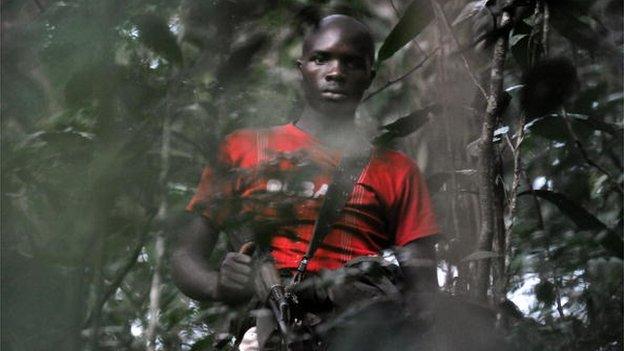
Some FDLR leaders feel their lives would be in danger if they returned to Rwanda
Twenty years after the Rwandan genocide, some of those responsible are still wreaking havoc in neighbouring Democratic Republic of Congo, where they are terrorising the local population and profiting from the area's rich natural resources. The BBC's Grainne Harrington reports on the UN's attempts to persuade them to lay down their weapons and return home.
"Vincent Miranzi" is on the legal affairs commission of the Democratic Forces for the Liberation of Rwanda (FDLR) but he won't tell the BBC his real name.
He arrived in what is now Democratic Republic of Congo after the Rwandan genocide, though he denies taking part in the slaughter of some 800,000 ethnic Tutsis and moderate Hutus, which has led to two decades of unrest across the region.
The FDLR has been accused of recruiting child soldiers, rape and systematic looting.
"It's true that not everybody in our ranks is an angel," he says calmly.
"Some can engage in repressive behaviour. That exists in other countries too, in all societies. But we have ways of dealing with that. Each time a case is identified, then they have to submit to strict regulations."
Mr Miranzi has come to meet me in the village of Luofu, a small village nestled in the lush green hills of North Kivu, DR Congo's eastern province, bordering Rwanda, which has borne the brunt of years of conflict.
Luofu is now just outside FDLR territory, but for most of the past decade, it was dominated by the Rwandan rebels.
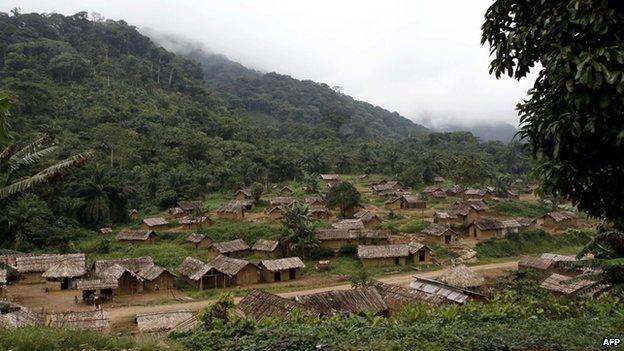
Villages across eastern DR Congo have been attacked by FDLR fighters
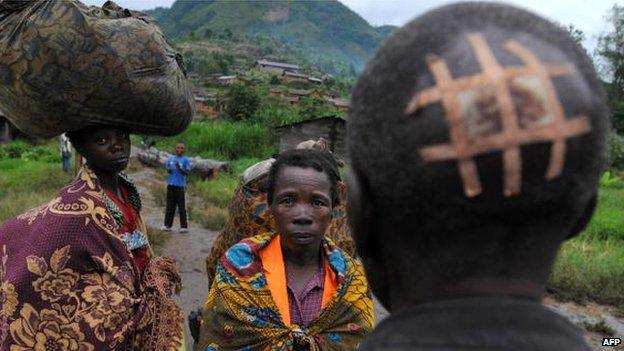
The FDLR have been accused of committing atrocities against Congolese civilians
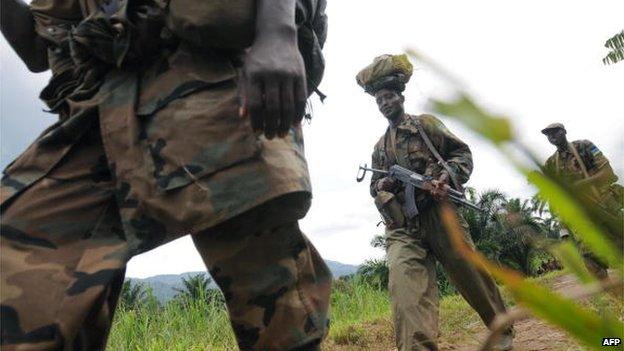
Rwanda has twice invaded DR Congo, saying it is trying to hunt down militias who took part in the genocide
They extorted money from locals, pillaged farmers' harvests and set up road blocks, demanding money or goods from anyone travelling through.
People here accuse the Congolese army of collaborating with them, leaving locals to fend for themselves.
"At one point, they [FDLR] came to burn the villages… more than 200 houses," says Eric Kambale, a trainee priest at Luofu parish.
"People burned inside, can you imagine? It terrified people. The Congolese army was one kilometre away when that happened."
He says the people of Luofu lived under the constant threat of war until UN forces regained control in 2010.
The UN mission in DR Congo (Monusco) has said that, after helping defeat the mainly Tutsi M23 rebels last year, the Hutu-led FDLR are next in the sights of its well-equipped special intervention brigade.
In the meantime, it is hoping to persuade the rank and file that their best option is to go back to Rwanda.
Monusco has set up mobile radio stations in remote areas, broadcasting messages of encouragement and success stories from reformed fighters living in Rwanda.
They give out their mobile phone numbers on the radio, and in leaflets airdropped from UN helicopters across rebel territory.
When the rebels call, the demobilisation team has to set up a meeting point and extract them before their commanders discover their plans.
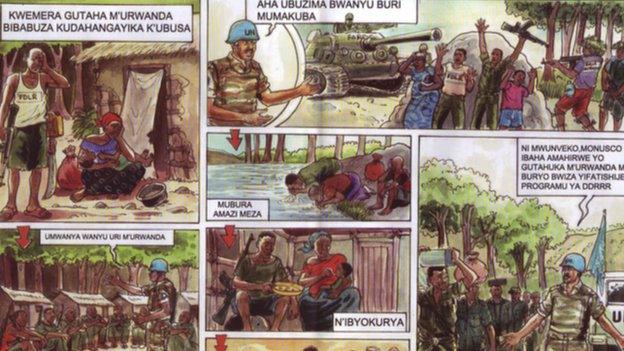
The UN drops leaflets to persuade the FDLR it is safe to return to Rwanda
"It's not always easy. People who want to leave need to do it secretly, because if they want to surrender, they'll be betrayed, and they risk being executed," says Abdulli Mohammed, the Monusco demobilisation officer for the FDLR territory just south of Luofu.
"Sometimes we go out on patrol and we don't find them, either because they've changed their minds, or they've been betrayed."
Mr Miranzi says that fighters are free to leave if they want, and that the reasons the FDLR stays in the North Kivu are to be found across the border.
"The riches of Rwanda are concentrated in the hands of a tiny number of people," he says.
"The rest are rotting in hardship. Nobody knows what's happening to them - they're dying of hunger."
Although some of the FDLR fighters are Congolese recruits and others are too young to have taken part in the genocide, the group's leaders say their lives would be in danger if they returned home.
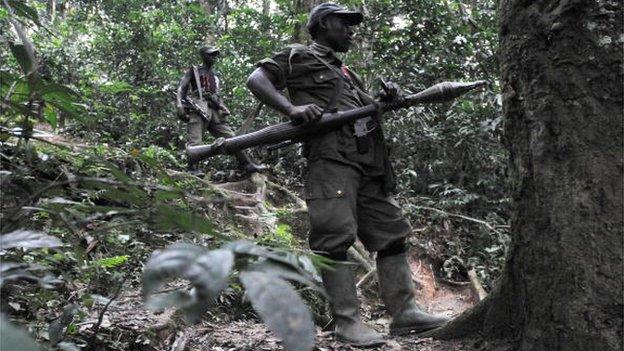
Many FDLR fighters are too young to have taken part in the genocide
The Rwandan government is now led by Tutsi former rebels who forced the Hutu authorities who perpetrated the genocide from power in 1994.
It has rejected calls for negotiation with the FDLR.
And there is another explanation for the rebels' refusal to return home.
Lying between FDLR territory and Rwanda is the Virunga National Park.
It is the oldest national park in Africa, home to rare mountain gorillas, lions and elephants.
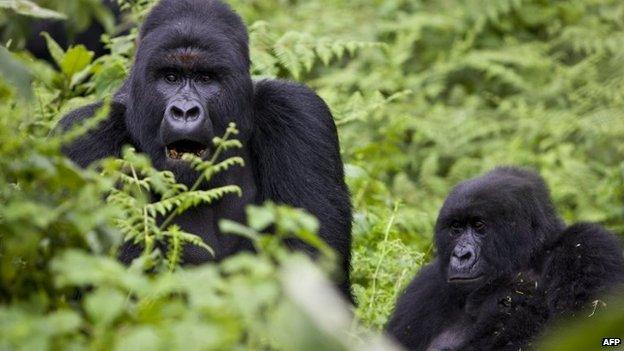
The decades of conflict have hit the mountain gorillas of Virunga national park
Park director Emmanuel de Merode has had years of dealings with the FDLR.
"They're very intent on making money," he says.
"There's the artisanal mining sector, where they loot from very poor mining communities. There are the park's forests, which are being cut down for charcoal.
"The charcoal industry has a turnover of about $35m a year. A significant proportion of that is channelled back though armed groups, in particular the FDLR."
In recent weeks, the FDLR has announced another ceasefire.
But attacks have continued on communities in its territory.
The UN says it is not the first time it has promised to stop fighting, and there is no sign yet of it disarming.
Twenty years since the genocide that brought them to DR Congo, FDLR leaders have found not only shelter, but status and riches.
As the legacy of mistrust continues between them and the Rwandan government, little wonder that disarmament and a return to their homeland holds little attraction.